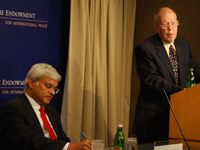Registration
You will receive an email confirming your registration.
IMGXYZ3190IMGZYXPakistan―a nation founded as a homeland for South Asian Muslims, most of whom follow a tolerant, nonthreatening form of Islam―has become a haven for al-Qaeda and domestic jihadist and sectarian groups.
John R. Schmidt, author of The Unraveling: Pakistan in the Age of Jihad, professorial lecturer at the Elliott School, and the senior U.S. political analyst in Pakistan in the years before 9/11, discussed the domestic policy choices and external factors which have led to this result. Carnegie’s Ashley J. Tellis moderated.
The Leaders of Pakistan
Tellis noted that Pakistan as a nation has changed drastically within the last decade, and that as much as external factors – such as American involvement in the region – are important, much of that change is due to state choices. Schmidt agreed, arguing that the puzzle lies in the fact that Pakistan’s leaders have always held personal religious beliefs that are strongly at odds with those more militant beliefs of radical Islam. Understanding how these same leaders led to the rise of jihad begins by understanding the leaders themselves:
- Civilian Political Class: Schmidt noted that Pakistan’s civilian political leaders are appropriately known as “feudals,” given that their preferred method of political rule is by dispersing state resources through patronage networks.
- Military Professional Class: The military, on the other hand, is the product of an extremely meritocratic system that leads to the only professional organization in Pakistan, said Schmidt.
- The Interaction of the Two Classes: Rule of Pakistan has alternated between these two classes, Schmidt said, leading to considerable tension between them. The result has been a political system that is oriented toward the short-term, and with no real desire to tackle the long-term problems facing Pakistan.
- The Social Compact: Tellis added that despite the tension between the two classes, they have established a social compact in which the military allows the feudal classes to preserve their influence in exchange for allowing the military a large degree of control over national security issues. This compact binds the two classes together, and ultimately freezes the prospect of democratization or any sort of political growth in Pakistan.
The Rise of Jihadism in Pakistan
- India: Schmidt noted that the Pakistani-Indian relationship has been plagued with tension since its inception, and that Pakistan has felt a profound sense of grievance over the issue of Kashmir. As a result, it has sought to offset India’s conventional superiority by turning to the unconventional means of surrogate actors.
- Surrogates Against the Soviets: When the Soviet Union invaded Afghanistan, Pakistan turned to surrogates to fight the occupying power, Schmidt said. Pakistani resources, along with those of the United States and Saudi Arabia, were used to strengthen the jihadist surrogates that were fighting within Afghanistan. By the time the Soviets were finally driven out, the jihadist groups had grown very powerful, and a sense of radical Islam had spread across the region.
- Exporting Jihad to India: The conclusion of the anti-Soviet jihad coincided with an uprising in Indian-controlled Kashmir, said Schmidt. With an opportunity to needle its long-time nemesis at hand, Pakistan encouraged jihadist groups to switch their focus from Afghanistan to India and Kashmir.
- Jihad in Afghanistan’s Civil War: In the meantime, Schmidt noted, Pakistan continued to support its surrogate groups in Afghanistan against Indian-backed groups. However, by the mid-1990s, Pakistani-backed groups had lost much of their influence. At the time, a new movement of radical mullahs was rising in the south of Afghanistan, and Pakistan switched its support to the new organization, called the Taliban.
Things Fall Apart: The Jihadist Blowback
- The Unraveling: As the twentieth century came to an end, Pakistan’s erstwhile proxies began showing new signs of independence, Schmidt added. In the east, Pakistan’s jihadist groups sparked a major conflict with India when they began to target civilians. In the west, the Taliban sheltered Osama bin Laden, embroiling Pakistan in an imbroglio with the United States.
- September 11: After the 9/11 terrorist attacks occurred, Pakistan was forced into an alliance with the United States. This alliance caused many former surrogates to turn against Pakistan, even as Pakistan continued to shelter others to the United States’ displeasure, explained Shmidt. When Pakistan did act, it often created new problems, such as the rise of the Pakistani Taliban.
- The Principal-Agent Problem: Tellis noted that this deterioration in control and relations was an example of the principal-agent problem, in which an agent increasingly gains the capacity to carry out its agenda, which often differs in some respects from the agenda of the principal. Tellis raised the issue of at what point in Pakistan will the gulf between the two agendas become wide enough that Pakistan actively turns on its former agents.
Schmidt noted that a dramatic difference in the goals of the United States and Pakistan, both in terms of foreign policies and in connection to the jihadist groups themselves, continues to bedevil the bilateral relationship. He concluded that the army remains the only institution within Pakistan powerful enough to stop the jihadist political force, even if all of Pakistan’s former surrogates turned against it. But the army is not powerful enough to win such a conflict, even if it prosecuted the fight earnestly. Schmidt argued that the situation in Pakistan will continue to become more violent, with little prospect in the short-term for resolution.
